Every five days, a country market converges in a horn-honking, pig-squealing clamor on the old arching stone bridge that spans the river coursing through here.
For as long as anyone can remember, the biggest crop in this valley has been its tall, thick corn. But in the last two years, a new crop, qinghao, or sweet wormwood, has been crowned king, driven by a desperate need in the tropical world for new malaria treatments.
The rugged valleys and steep gorges along the Apeng River here in central China have long been a symbol of idyllic remoteness. Even China's dazzling economic takeoff had done little to change that, until the World Health Organization approved a malaria treatment using artemisinin, the active ingredient of the qinghao plant, in 2001.
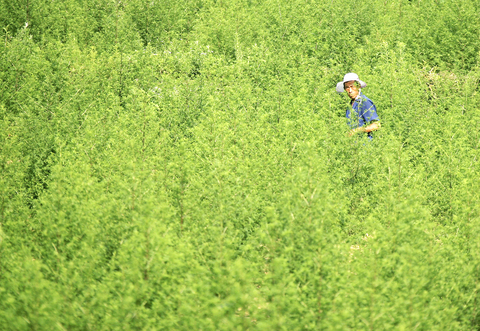
Since then, the plant's market value has nearly quadrupled. In the process, qinghao has become an unlikely driver of globalization in these parts, sending peasants scouring the mountainsides to harvest the wild bush.
Just as eager to cash in, farmers are replacing plots of corn, tobacco and potato with the herb, which is bought and sold from bulging burlap sacks amid frenzied market day crowds by dealers wielding brass handheld scales.
Despite China's long history and ancient medical traditions, artemisinin-based drugs are the first Chinese pharmaceutical product to be broadly distributed internationally, beyond more traditional remedies like ginseng.
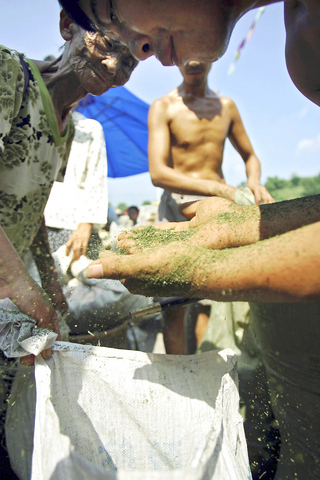
In antiquity, it was written that parts of this southeastern region of
Chongqing Province were so isolated that the people here did not know what dynasty they lived under. Today, mounting a full-court press driven in part by demand for the drug, the Chinese government is rushing to remedy that, building the first highways into the area, along with a rail line and a small airport.
Confusion over dynasties seems to have given way nowadays to confusion over all the fuss being made over sweet wormwood, an ancient folk remedy for colds and fevers, even as trade in the herb begins to line people's pockets.
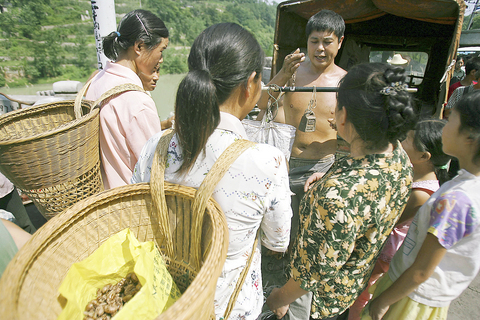
"I don't know what medicine this makes," said Sun Lingui, a 23-year-old qinghao dealer who had staked out a prime position on the bridge here on a recent market day. He sold the herb along with a bushel full of dried beetles that he said were a remedy for respiratory problems.
"I know it is used to extract something called artemisinin," Sun added. "Anyway, it is for some kind of medicine, and I hear that tropical countries all need it."
Sun said he had gleaned the little he knew about the plant from a television program, which spoke of the herb's rapidly increasing value and alluded to its health benefits. What those benefits were, he, like the peasants surrounding him, could not quite recall.
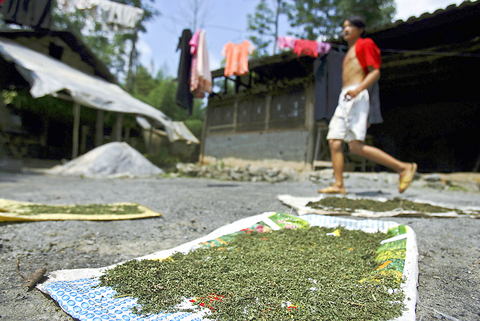
The fact that this traditional Chinese drug, which the peasants of this village say is good for everything from sniffles to healing wounds, is the greatest recent hope in global efforts to fight malaria, which kills more than a million people each year, mostly in Africa, is scarcely appreciated here.
With established anti-malarial medicines rapidly losing their effectiveness, the World Health Organization recommended in 2001 that countries afflicted with the disease switch to a combination therapy based in part on the Chinese drug. After a slow start in adopting artemisinin-based drugs, demand has skyrocketed in the last two years, with projections that 300 million doses will be needed next year.
Ding Derong, a scientist with China's Southwest Agriculture University who has studied artemisinin for 30 years, said that 30,000 tonnes to 40,000 tonnes of the crop would be needed to meet that demand, but that only 20,000 were likely to be harvested.
"This is a very easy thing to plant and grow, but it is hard to cultivate good quality seeds," Ding said. "At first, farmers will choose cheap seeds over good ones. The result is there will be a lot of disorder."
Jiang Yifei, spokeswoman of the Holley Corp, the largest Chinese producer of artemisinin, said the biggest challenge in increasing production was "organizing farmers to start standardized cultivation."
Holley supplies the Swiss pharmaceutical giant Novartis with artemisinin. Novartis uses the active ingredient from the herb to produce the drug Coartem, which it supplies at cost to the World Health Organization for distribution.

No one saw it coming. Everyone — including the Chinese Nationalist Party (KMT) — expected at least some of the recall campaigns against 24 of its lawmakers and Hsinchu Mayor Ann Kao (高虹安) to succeed. Underground gamblers reportedly expected between five and eight lawmakers to lose their jobs. All of this analysis made sense, but contained a fatal flaw. The record of the recall campaigns, the collapse of the KMT-led recalls, and polling data all pointed to enthusiastic high turnout in support of the recall campaigns, and that those against the recalls were unenthusiastic and far less likely to vote. That

Behind a car repair business on a nondescript Thai street are the cherished pets of a rising TikTok animal influencer: two lions and a 200-kilogram lion-tiger hybrid called “Big George.” Lion ownership is legal in Thailand, and Tharnuwarht Plengkemratch is an enthusiastic advocate, posting updates on his feline companions to nearly three million followers. “They’re playful and affectionate, just like dogs or cats,” he said from inside their cage complex at his home in the northern city of Chiang Mai. Thailand’s captive lion population has exploded in recent years, with nearly 500 registered in zoos, breeding farms, petting cafes and homes. Experts warn the

A couple of weeks ago the parties aligned with the People’s Republic of China (PRC), the Chinese Nationalist Party (KMT) and the Taiwan People’s Party (TPP), voted in the legislature to eliminate the subsidy that enables Taiwan Power Co (Taipower) to keep up with its burgeoning debt, and instead pay for universal cash handouts worth NT$10,000. The subsidy would have been NT$100 billion, while the cash handout had a budget of NT$235 billion. The bill mandates that the cash payments must be completed by Oct. 31 of this year. The changes were part of the overall NT$545 billion budget approved
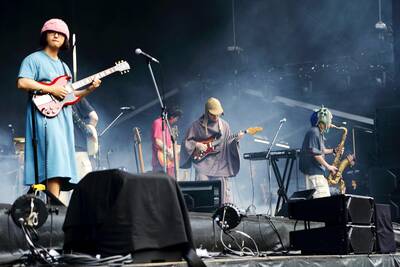
Before performing last Friday at Asia’s bellwether music festival, Fuji Rock in Japan, the Taiwanese indie band Sunset Rollercoaster (落日飛車) had previously performed on one of the festival’s smaller stages and also at Coachella, the biggest brand name in US music festivals. But this set on Fuji Rock’s main stage was a true raising of the bar. On a brilliant summer’s evening, with the sun rays streaming down over a backdrop of green mountains and fluffy white clouds, the performance saw the Taiwanese groovemasters team up with South Korean group Hyukoh, with whom they’ve formed a temporary supergroup called AAA